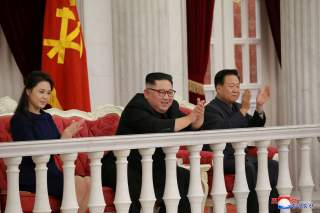What Kim Jong Un Really Wants, and How America Should Respond
"Kim’s young age nearly forces him to make quick and ambitious achievements, but it also encourages him to think long-term about boosting the economy and improving his country’s place in the world, which will entail economic reform and geopolitical repositioning among the great powers and regional states."
Continuous and protected engagement is a three-track approach in which advancement on one track used to incentivize improvement on another. On the arms control track, the policy encourages, persuades, and when necessary, pressures North Korea to reduce its nuclear and missile arsenal to the level of minimum deterrence. Contingent on the level of trust between North Korea and its neighbors and the United States, a North Korean minimum deterrence capability may or may not require the possession of nuclear weapons.
On the political track, the United States should move quickly but in phases to normalize relations with North Korea. The policy promotes reconciliation and builds trust between North Korea and its current enemies, including the United States, South Korea, and Japan. It looks beyond a formal termination of the Korean War and strives for a treaty of peace and friendship between North Korea and the United States. It encourages similar treaties between North Korea and South Korea and Japan. Kim Jong-un’s achievements of turning the United States from an enemy to a friend and improving the lives of the North Korean people should replace North Korea’s pride in the military field as a major source of Kim’s domestic legitimacy. The cessation of North Korea’s anti-U.S. propaganda should be a condition for normalization of relations with the United States. The policy envisages a comprehensive non-aggression pact and a partnership for peace and development between the United States, South Korea, Japan and North Korea.
On the economic track, easing sanctions should be in lockstep with North Korea’s arms reduction. At some point down the road, sanctions can be fully lifted without complete denuclearization. Looking beyond this point, the policy promotes inter-Korean economic integration as a pillar of peace and security on the peninsula. After normalization of diplomatic relations, the United States and North Korea should start negotiations on normal trade relations and a trade and investment framework agreement. Contingent on the situation at hand, the policy treats trade and investment sometimes as rewards for, other times as enablers of, arms control and political reconciliation.
When Kim Jong-un and Donald Trump arrive in Vietnam for their second summit later this month, they will see a vivid example of how Communist Party rule, economic reform, human rights improvement and a comprehensive partnership with the United States can co-exist. The history of U.S.-Vietnam relations in the last three decades has shown that engagement is the right policy to turn former enemies into friends. Engagement sometimes backfires not because it is the wrong policy but because it is applied to the wrong situation. Engagement has failed to make China a real friend of the United States and instead helped it to become America’s peer competitor because China’s huge size has enabled Beijing to disarm many protective mechanisms of engagement and because China’s ambition is to replace the United States as the predominant power in Asia. Vietnam and North Korea both lack China’s size and ambition. Their markets are not so big as to be indispensable. Their ambitions are not to supplant America; instead, they are limited to regime survival, economic development, and national independence.
North Korea is an opportunity masquerading as a threat. The United States must not miss its larger struggle in Asia for the squabbles with North Korea.
Alexander L. Vuving is Professor at the Daniel K. Inouye Asia-Pacific Center for Security Studies. The views expressed in this article are his own and do not necessarily reflect those of the DKI APCSS, the Department of Defense, or the U.S. Government.
Image: Reuters

